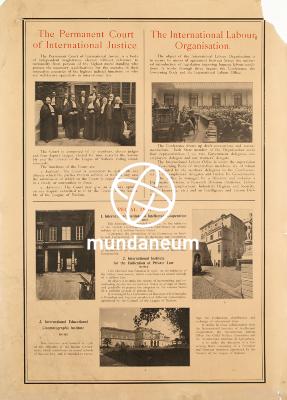Affiche
Special Institutes
Numéro d'inventaire :
ARC-MUND-AFF-OI-030Special Institutes
Personnes liées
Société des Nations (SDN) (Editeur)Objets liés
The secretariat (Matériel associé (voir aussi))Organisation of the League of Nations (Matériel associé (voir aussi))
Social questions (Matériel associé (voir aussi))
Mandates (Matériel associé (voir aussi))
Information section (Matériel associé (voir aussi))
Administrative field (Matériel associé (voir aussi))
Budget of the League (Matériel associé (voir aussi))
Refugees (Matériel associé (voir aussi))
The Library (Matériel associé (voir aussi))
Disarmament (Matériel associé (voir aussi))
Financial field (Matériel associé (voir aussi))
Date :
1920 - 1930 (Date d'édition)
Mots clés :
- Société des Nations
- pacifisme
Description
Texte : The Permanent Court of International Justice. The Permanent Court of International Justice is a body of independent magistrates, elected without reference to nationality from persons of the highest moral standing who possess the necessary qualifications for the exercise in their respective countries of the highest judicial functions, or who are wellknown specialists in international law. The Court is composed of 15 members, eleven judges and four deputy judges, elected for nine years by the Assembly and the Council of the League of Nations, voting simultaneously. The functions of the Court are : 1. Judicial : the Court is competent to deal with any dispute which the parties thereto submit, as well as any case the submission of which to the Court is especially provided in a treaty or convention in force. 2. Advisory : The Court may give an advisory opinion on any dispute submitted to it by the Council or the Assembly of the League of Nations. / The International Labour Organisation. The object of the International Labour Organisation is to secure by means of agreement between States the universal introduction of legislation imposing humane labour conditions. It works through three organs, the Conference, the Governing Body and the International Labour Office. The Conference draws up draft conventions and recommendations. Each State member of the Organisation sends four representatives, i.e., two Government delegates, one employers' delegate and one workers' delegate. The International Labour Office is under the supervision of a Governing Body of twenty-four members, six of whom are appointed by the workers' delegates to the Conference, six by the employers' delegates by a Director and includes a Diplomatic Division, a Research Division (Statistics, Labour Legislation, Unemployment, Industrial Hygiene and Security, Social Insurance, ect.) and an Intelligence and Liaison Division. / Special Institutes. 1. International Institute of Intellectual Cooperation (Paris). This Institute was founded in 1925, on the initiative of the French Government, which contributes an annual subsidy of 2 1/2 million French francs. It prepares the discussions of the Committee on Intellectual Cooperation, executes its decisions and recommendations and, in a general way, promotes the co-ordination of intellectual work throughout the world. It is under the direction of a Governing Body composed of members of the International Committee on Intellectual Cooperation. / 2. International Institute for the Unification of Private Law (Rome). This Institute was founded in 1926, on the initiative of the Italian Government, which contributes an annual subsidy of 1 million Lire. Its object is to study the means of harmonising and co-ordinating private law as between States or groups of States and gradually to prepare the adoption by the various States of a uniform system of private law. It is managed by a Committee of Directors which includes a President and fourteen members of different nationalities, appointed by the Council of the League of Nations. / 3. International Educational Cinematographic Institute (Rome). This Institute was founded in 1928, on the initiative of the Italian Government, which contributes an annual subsidy of 890.000 Lire, and is intended to encourage the production, distribution and exchange of educational films. It works in close collaboration with the International Institute of Intellectual Cooperation, the International Labour Officen the Child Welfare Committee and the International Institute of Agriculture. It is under the direction of a Governing Body consisting of a President and fourteen members appointed by the Council of the League of Nations.Illustration : cinq photographies en noir et blanc représentant la Cour permanente de Justice international, l'Organisation International du Travail, l'Institut International de la Coopération Internationale, de l'Institut International pour l'unification du droit privé et de l'Institut International d'éducation cinématographique.











